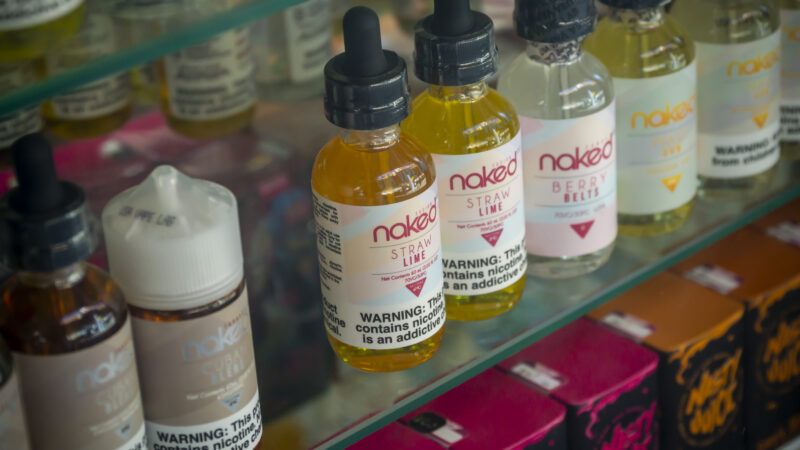Senate Democrats Nix a Regressive, Unhealthy Vaping Tax Endorsed by the House
The perverse provision would have discouraged smokers from switching to a far less hazardous source of nicotine.

Senate Democrats have nixed the idea of imposing a new federal tax on nicotine vaping products, which would have disadvantaged a potentially lifesaving alternative to cigarettes and violated President Joe Biden's pledge to avoid raising taxes on American households that earn less than $400,000 a year. The Wall Street Journal reports that Sen. Catherine Cortez Masto (D–Nev.), a member of the Senate Finance Committee, "pushed to remove the tax," which was included in the House version of the Build Back Better spending package, and "helped force its deletion."
House Democrats originally proposed a $100.66 excise tax per 1,810 milligrams of nicotine in e-liquids, which would have added about $60 to the cost of a high-strength 60-milliliter bottle containing 18 milligrams of nicotine per milliliter. For some products, retailers reported, the tax would have doubled or tripled the retail price. The same proposal also would have increased the federal excise tax on cigarettes and other tobacco products, yielding an estimated $96 billion in new revenue over a decade.
Last month that proposal was replaced by a plan to tax e-liquids at $50.33 per 1,810 milligrams of nicotine, still a hefty levy that would have substantially increased the cost of vaping. And unlike the earlier plan, this provision would not have boosted federal taxes on cigarettes, so it would have reduced the comparative economic appeal of vaping and raised only about $9 billion over a decade.
Supporters of the nicotine tax portrayed it as a "public health" measure, aimed largely at deterring underage consumption. But it would have discouraged current smokers from switching to a far less hazardous source of nicotine, resulting in more tobacco-related deaths. The increased cost also would have encouraged former smokers who are now vaping to switch back to a much deadlier habit.
"There is no valid reason to impose new taxes on tobacco-free nicotine products, particularly at a time when American families are feeling the impact of rising inflation," Gregory Conley, president of the American Vaping Association, said in response to the provision. He noted that House Democrats were perversely "aiming to make smoke-free alternatives more expensive than smoking."
Cortez Masto did not mention the public health implications of the tax, focusing instead on the provision's inconsistency with Biden's promise. Last month she described the proposed levy as "a regressive tax on the very people that we're trying to cut costs, cut taxes on." Sen. Joe Manchin (D–W.Va.), who in November said the nicotine tax "doesn't make any sense to me whatsoever," likewise did not mention the harm-reducing potential of vaping products. Neither did Sen. Kyrsten Sinema (D–Ariz.), who also opposed the tax.
Michelle Minton, a senior fellow at the Competitive Enterprise Institute who follows tobacco policy, welcomed the decision to eliminate the vaping tax. "By dropping the nicotine tax from the Build Back Better bill," Minton said in a press release, "Democrats have averted a public health disaster. Imposing a tax increase on safer nicotine products would have failed to meaningfully address youth vaping and, worse, would have discouraged adult smokers from switching to life-saving alternatives, particularly among lower-income Americans. Generating revenue off the increased misery and poverty of predominantly lower-income Americans is no way to build back better."
In an August American Journal of Public Health article, David J.K. Balfour and 14 other leading tobacco researchers warned that "policies intended to reduce adolescent vaping," including taxes and flavor bans, "may also reduce adult smokers' use of e-cigarettes in quit attempts." They emphasized that "the potential lifesaving benefits of e-cigarettes for adult smokers deserve attention equal to the risks to youths."


Show Comments (63)